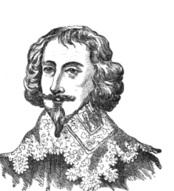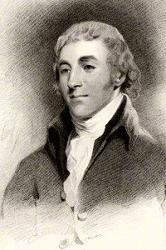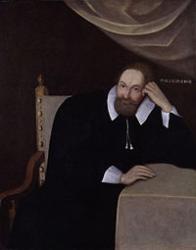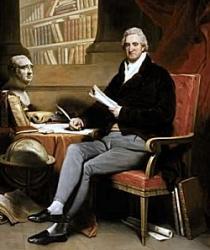Planning worship?
Check out our sister site, ZeteoSearch.org,
for 20+ additional resources related to your search.
- |
User Links
Person Results
‹ Return to hymnal





Export as CSV
Thomas Jervis
1748 - 1833 Person Name: Jervis Hymnal Number: 20 Author of "With sacred joy we lift our eyes" in A Collection of Psalms and Hymns for Christian Worship (6th ed.) Jervis, Thomas, son of a Presbyterian Minister of the same name, was born at Ipswich in 1748, and educated for the Ministry at Hoxton. In 1770 he was appointed classical and mathematical tutor at the Exeter Academy. From 1772 to 1783 he was tutor to the sons of the Earl of Shelburne, at Bowood, where Dr. Priestley was librarian. In the latter year Jervis succeeded Dr. A. Rees at St. Thomas's Southwark, moving in 1796, after the death of Dr. Kippis, to the Princes' St. Chapel, Westminster. From 1808 to 1818 he was minister at the Mill Hill Chapel, Leeds. After his retirement he lived in the neighbourhood of London, and died there in 1833. Jervis was one of the four editors of A Collection of Hymns & Psalms for Public & Private Worship, London, 1795. He contributed 17 hymns to the 1st ed., and 4 to its Supplement, 1807. Of these several are found in later Unitarian collections in Great Britain and America, including:—
1. God to correct a guilty world. Divine Providence.
2. Great God, Thine attributes divine. Confidence in God.
3. Lord of the world's majestic frame. Praise a Duty.
4. Shall I forsake that heavenly Friend? Constancy desired.
5. Sweet is the friendly voice which [that] speaks. Peace to the Penitent.
6. Thou, Lord, in mercy wilt regard. Penitence.
7. With sacred joy we lift our eyes. Divine Worship. This is given in Laudes Domini, N.Y., 1884, as: "With joy we lift our eyes."
These hymns all date from 1795, and the most popular are Nos. 4 and 6. [Rev. Valentine D. Davis, B.A.]
--John Julian, Dictionary of Hymnology (1907)
Thomas Jervis
George Sandys

1577 - 1643 Person Name: Sandys Hymnal Number: 85 Author of "Thou who dwell'st enthroned above!" in A Collection of Psalms and Hymns for Christian Worship (6th ed.) Sandys, George, son of Dr. Edwin Sandys, Archbishop of York, was born at Bishopthorpe Palace, York, in 1577, and educated at St. Mary Hall and Corpus Christi College, Oxford. For some years he devoted himself to travelling in Europe and Asia, and published in 1615 a curious account of his experiences. After visiting America, where he was for a time the Treasurer of the British Colony of Virginia, he became, on his return, a Gentleman of the Privy Chamber of Charles I. He died at Bexley Abbey, Kent, March 1643. His publications included his Traveller's Thanksgiving; the prose work on his travels, A Relation of a journey begun in 1610, &c, 1615; a translation of the Metamorphoses of Ovid; and Grotius's tragedy of Christ's Passion. His productions which most nearly concern hymnology were:—
(1) A Paraphrase upon the Psalmes of David, and upon the Hymns dispersed throughout the Old and New Testaments. London: at the Bell in St. Paul's Churchyard. MDCXXXVI.
(2) A Paraphrase upon the Divine Poems by George Sandys. London: at the Bell in St. Paul's Churchyard. M.DCXXXVIII. This volume contained the Paraphrase of the Psalms, paraphrases upon Job, Ecclesiastes, the Lamentations of Jeremiah, and the Songs collected out of the Old and New Testaments.
(3) His paraphrase of The Song of Solomon was published in 1642. The most available form of these works is the Rev. R. Hooper's reprint of Sandys's Poems, in Smith's Library of Old Authors.
A few only of Sandys's versions of the Psalms are found in modern hymnbooks, although they were set to music by Henry Lawes. His influence, however, upon later paraphrasers was considerable. The following, together with a few others annotated under their respective first lines, are in common use:—
1. How are the Gentiles all on fire. Ps. ii.
2. Lord, for Thee I daily cry. Ps. lxxxiv.
3. My God, Thy suppliant hear. Ps. lxxxvi.
4. Praise the Lord enthroned on high. Ps. cl.
5. Sing the Great Jehovah's praise. Ps. lxvi.
6. Thou, Lord, my witness art. Ps. cxxxi.
7. Thou who art [dwellest] enthroned above. Ps. xcii.
8. You, who dwell above the skies. Ps. cxlviii.
These paraphrases as in common use are in the form of centos.
--John Julian, Dictionary of Hymnology (1907)
====================
Sandys, G.., p. 994, i. Another cento from his Paraphrase upon the Psalmes of David, &c, 1638, as "Let God, the God of battles, rise" (Ps. lxviii.), is in the Hymn Book for Use in Wellington College, 1902.
--John Julian, Dictionary of Hymnology, New Supplement (1907)
George Sandys
Thomas Gisborne

1758 - 1846 Person Name: Gisborne Hymnal Number: 270 Author of "A soldier's course, from battles won" in A Collection of Psalms and Hymns for Christian Worship (6th ed.) Thomas Gisborne was born at Derby, in 1758. He became perpetual Curate of Barton-under-Needwood, Staffordshire, in 1783, and Prebendary of Durham in 1826. He died in 1846.
--Annotations of the Hymnal, Charles Hutchins, M.A. 1872.
==================
Osborne, Thomas, M.A., son of Mr. John Gisborne, of Yoxall, was b. circa 1760, and educated at St. John's College, Cambridge, where he was 5th Wrangler of his year, and Chancellor's Medalist, graduating B.A. in 1780, and M.A. in 1783. Subsequently he became a Prebendary of Durham. He was the author of Sermons; the Duties of Men; the Duties of Women; Poems Sacred and Moral, 1799 (to the later editions of which his hymns were added), 3rd ed. 1803; and of another volume of poetry entitled, Walks in a Forest, 1795. The following hymns by him are found in the Uttoxeter Selection:—
1. A soldier's course from battles won. Soldiers of Christ. No. 72, in 6 stanzas of 4 lines, and in several hymn-books.
2. Hark! 'tis the bell with solemn toll. Death. No. 74, in 6 stanzas of 4 lines.
3. O Father, glorify Thy name. In Sickness. No. 92, in 5 stanzas of 4 lines.
4. Saviour! when night involves the skies. Christ All and in All. No. 80, in 4 stanzas of 4 lines.
5. Thy humblest works with full accord. Teachings of Nature. No. 118, in 4 stanzas of 4 lines.
6. When groves by moonlight silence keep. The hour of Peace. No. 116, in 4 stanzas of 4 lines.
All the above hymns, except No. 2, are in Gisborne's Poems, 3rd ed., 1803.
-- Julian, John, Dictionary of Hymnology (1907)
Thomas Gisborne
Sir Henry Wotton

1568 - 1639 Person Name: Henry Wotton Hymnal Number: 289 Author of "How happy is he born or taught" in A Collection of Psalms and Hymns for Christian Worship (6th ed.) Wotton, Sir Henry, M.A., born in Kent in 1568, and educated at New and at Queen's Colleges, Oxford. After spending nine years on the Continent, on his return he became secretary to Robert, Earl of Essex, with whom he continued until Essex was committed for high treason, when he retired to Florence. There he became known to the Grand Duke of Tuscany, and was sent by him, in the name of "Octavio Baldi," with letters to James VI., King of Scotland, in which the king was informed of a design against his life. On succeeding to the English throne James knighted Wotton and sent him as ambassador to the Republic of Venice. In 1623 he was made Provost of Eton (having previously taken Deacon's Orders). He died in 1639. His works include The Elements of Architecture, Parallel between the Earl of Essex and the Duke of Buckingham, Essay on Education, &c. His poems and other matters found in his manuscripts were published posthumously by Izaak Walton in 1651, as Reliquiae Wottonianae. This has been several times reprinted
--John Julian, Dictionary of Hymnology (1907)
Sir Henry Wotton
Jane Cotterill
1790 - 1825 Person Name: Mrs. Cotterill Hymnal Number: 415 Author of "O thou, who hast at thy command" in A Collection of Psalms and Hymns for Christian Worship (6th ed.) Cotterill, Jane, née Boak, daughter of Rev. John Boak, and mother of the Right Rev. Henry Cotterill, Bishop of Edinburgh; born in 1790, married 1811 to the Rev. Joseph Cotterill; died 1825. Mrs. Cotterill contributed to the Appendix to the 6th ed. of Cotterill’s Selection, 1815, the following hymns:—
1. "O! from the world's vile slavery," (For Holiness). 2. "O Thou! Who hast at Thy command," (For Resignation). These hymns were repeated in Montgomery's Christian Psalmist, 1825, and Mrs. Cotterill's name was appended thereto for the first time. Their use is not extensive. The first, "O! from the world's," &c, is found in Kennedy, 1863, No. 521, as, "From this enslaving world's control," the alterations being by Dr. Kennedy.
--John Julian, Dictionary of Hymnology (1907)
Jane Cotterill
James Flint
1779 - 1855 Person Name: Flint Hymnal Number: 527 Author of "Here to the High and Holy One" in A Collection of Psalms and Hymns for Christian Worship (6th ed.) Flint, James, D.D., born at Reading, Mass., 1779, and graduated at Harvard, 1802. In 1806 he became pastor of a Unitarian Church at East Bridgewater, Mass., from which he passed to East Church, Salem, 1821. Died in 1855. In 1820 he contributed one hymn to Sewell’s New York Collection, and in 1843 he also published A Collection of Hymns, to which he contributed from 10 to 12 originals.
His best known hymns are:—
1. Here to the High and Holy One. This hymn, "On leaving an Ancient Church," appeared in the Cambridge Selection of 1828.
2. In pleasant lands have fallen the lines. Remembrance of our Fathers. Written for the bicentenary of Quincy, Mass., May 25, 1840, and published in his Collection, 1843.
3. Happy the unrepining poor. Appeared in Sewell's New York Collection, 1820. Dr. Flint's hymns are unknown to the English Collections.
[Rev. F. M. Bird, M.A.]
--John Julian, Dictionary of Hymnology (1907)
James Flint
William Roscoe

1753 - 1831 Person Name: Roscoe Hymnal Number: 80 Author of "Let one loud song of praise arise" in A Collection of Psalms and Hymns for Christian Worship (6th ed.) Roscoe, William, the father, was born March 8, 1753, in Liverpool, of humble origin. After very meagre schooling, and three years of work in his father's market garden, he was articled to an attorney, and subsequently practised in Liverpool till 1796, when he withdrew from the profession. From the first literature was his chief delight, and throughout a long career of public usefulness he united its pursuit with the efforts of enlightened patriotism and the advocacy of higher education and reform. Liverpool was a centre of the old slave-trade, and Roscoe was one of the first to raise his voice against the iniquity. At the age of 20 he had already uttered a protest in his descriptive poem Mount Pleasant, and in 1787 he published a longer poem, The Wrongs of Africa (Pt. ii. 1788), devoted to the subject. During his brief parliamentary experience as member for Liverpool, in 1807, he had further opportunity of advocating the cause of liberty and humanity. His first great historical work, the Life of Lorenzo dé Medici, was published in 1796, and the Life and Pontificate of Leo the Tenth, in 1805. After withdrawing from his legal practice, Roscoe had hoped to be able to devote himself entirely to letters, but the claims of friendship induced him in 1800 to enter into a banking business, which involved him in commercial troubles, ending in 1820 in his bankruptcy. His library had to be sold, but part of it was bought by friends, and presented to the Liverpool Athenæum, which in 1789 Roscoe had been instrumental in founding. In 1822 he published Illustrations of the Life of Lorenzo dé Medici, defending the views adopted in his former history, and two years later edited a new edition of Pope's works, with a life of the poet. He died June 30, 1831. (Cf. The Life of William Roscoe, by his son, Henry Roscoe, in 2 vols., London, T. Cadell, 1833.)
As a member of the congregation of Unitarians meeting in Renshaw Street Chapel, Liverpool, Roscoe took part in preparing A Selection of Psalms and Hymns for Public and Private Worship, printed for their use in 1818. He contributed eight hymns and the concluding anthem. Of these hymns the following are in common use at the present time:—
1. Let our loud song of praise arise. Praise.
2. Go, suffering habitant of earth. Life, a Warfare.
3. Great God, beneath Whose piercing eye. Divine Providence.
4. Thus said Jesus, Go and do. Love to our Neighbour.
5. What is the first and great command ? The Commandments.
These hymns are in several Unitarian collections, including Martineau's Hymns, 1840. No. 3 was written in 1788, as a "secular hymn" of ten stanzas, to be sung at the Benn's Garden Chapel on the Centenary of the Revolution.
--John Julian, Dictionary of Hymnology (1907)
William Roscoe
William Hamilton Drummond

1778 - 1865 Person Name: Drummond Hymnal Number: 91 Author of "The God who reigns alone" in A Collection of Psalms and Hymns for Christian Worship (6th ed.) Drummond, William Hamilton, D.D., son of an Irish physician, was born at Ballyclare, Antrim, Ireland, 1772, and died at Dublin, Oct. 16, 1865. Educated for the ministry at the University of Glasgow, he became, in 1793, the pastor of the Second Presbyterian Church, Belfast, and in 1816, of the Strand Street Chapel, Dublin. His poetical works include:—
(1) Juvenile Poems, 1797; (2) Trafalger, 1805; (3) The Giant's Causeway, 1811; (4) Clontarf, 1817; (5) Who are the Happy? a Poem, on the Christian Beatitudes, with other Poems on Sacred Subjects, 1818.
In 1818 A Selection of Psalms & Hymns for the Use of the Presbytery of Antrim, and the Congregation of Strand Street, Dublin, was published at Belfast. This Selection was probably edited by Dr. Drummond. It contained several of his hymns. Five of these (Nos. 84, 190, 201, 236, 264) were contributed to that edition.
From Who are the Happy? the following hymns have come into common use:—
1. A voice from the desert comes awful and shrill. Advent. This is in extensive use in the Unitarian hymn-books of America.
2. Come, let us sound her praise abroad. Charity.
3. Father, I may not ask for less. Charity. This is stanzas ii.-v. of No. 2, with a new introductory stanza. In this form the hymn was given in the Leeds Hymn Book, 1853.
4. Give thanks to God the Lord. Victory through Christ. Limited in use, although a hymn of much spirit. It appeared in the Belfast Psalms & Hymns, 1818.
5. O had I the wings of a dove. Retirement. This hymn is not suited to congregational use. It appeared in the Belfast Psalms & Hymns, 1818.
The original texts of these hymns are in Lyra Britannica, 1867, from whence also most of the biographical facts have been taken. A few of Drummond's hymns, in addition to those named, are found in some American Unitarian collections.
-- John Julian, Dictionary of Hymnology (1907)
======================
Drummond, William, p. 312, ii. In the British Museum there is a copy of Drummond's Poems as fol¬lows :— Poems by William Drummond of Hawthornedene. The second Impression, Edinburgh. Printed by Andro Hart, 1616. Neither the Flowers of Zion, nor the translations from the Latin are therein.
--John Julian, Dictionary of Hymnology, Appendix, Part II (1907)
William Hamilton Drummond
Henry Moore
1732 - 1802 Hymnal Number: 281 Author of "Supreme and universal light!" in A Collection of Psalms and Hymns for Christian Worship (6th ed.) Moore, Henry, 1732-1802. Son of a Presbyterian minister of the same name at Plymouth. Educated at Doddridge's Academy at Northampton, from 1757 to 1788 minister at Modbury, and then at Liskeard. Author of Lyrical and Miscellaneous Poems, published posthumously with a memoir by Dr. Aikin. Of his hymns, which are frequent in the books later than Kippis, the Dukinfield Collection, 1822, gives 5.
1. All earthly charms, however dear. The unfading beauty of holiness.
2. Amidst a world of hopes and fears. A prayer for guidance.
3. Assist us, Lord, to act, to be. Divine Help Solicited.
4. My God, thy boundless love I praise. The divine Love.
5. Soft are the fruitful showers that bring. A song of spring and New Life.
6. Supreme and universal light. Prayer for spiritual excellence.
--John Julian, Dictionary of Hymnology (1907)
Henry Moore
John Patrick
1632 - 1695 Person Name: Patrick Hymnal Number: 83 Author of "O God, we praise thee and confess" in A Collection of Psalms and Hymns for Christian Worship (6th ed.) John Patrick, a brother of Bishop Simon Patrick, was Prebendary of Peterborough, 1685; Precentor of Chichester, 1690; and preacher at the Charter-House, in the Chapel of which he was buried on his death, in 1695. His "Psalms of David, in Metre," were much used by Presbyterians and Independents until superseded by the compositions of Watts.
----Annotations of the Hymnal, Charles Hutchins, M.A. 1872.
John Patrick


 My Starred Hymns
My Starred Hymns


